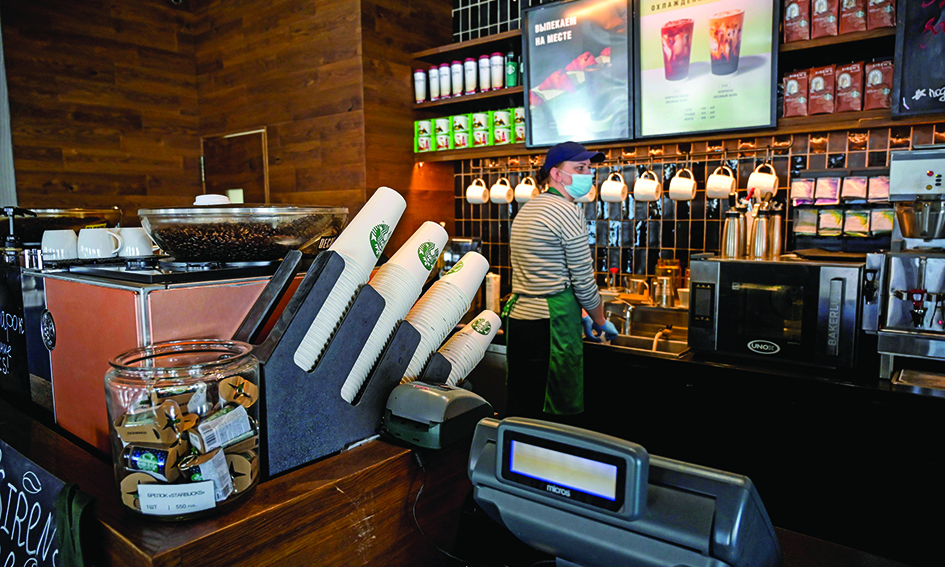MOSCOW: From closed airspace to frozen assets and oil bans, Western countries have announced increasingly severe economic sanctions against Russia over its invasion of Ukraine.
Here is an overview:
Energy
The United States and Britain took a major swing at Russia's economy on Tuesday as they targeted the country's vital energy sector. President Joe Biden announced a ban on US imports of Russian oil and gas while Britain said it would phase out crude imports from the country by the end of this year. Prior to the announcements, energy giant Shell said it would immediately stop Russian oil purchases. Russia is the world's largest producer of gas and second-largest producer of oil. The European Union has treaded more carefully, with Germany, the Netherlands and Bulgaria warning against an abrupt EU-wide ban on Russian energy.
The European Commission said Tuesday that it wants to cut gas imports from Russia by two thirds by the end of this year. In its plan, the EU said the bloc could become fully independent of Russian gas, oil and coal by 2030. Germany has already halted the certification process for the Nord Stream 2 gas pipeline, a key conduit designed to increase deliveries of Russian gas to Germany. Russian gas giant Gazprom has been blocked from raising funds on Western financial markets.
Financial sector
The West has targeted the financial sector to limit Russia's capacity to fund the war. In a major blow to the Russian financial system, the European Union has cut seven Russian banks from the SWIFT messaging system, which allows banks to communicate rapidly and securely about transactions. Concerned by sanctions, Russia's largest lender Sberbank has said it was leaving the European market.
The bloc also barred new EU investment in the Russian Direct Investment Fund (RDIF) in a similar move to that of London, which had added the fund to its list of sanctioned Russian entities. The United States and the EU have directly targeted Russia's central bank, with a ban on all transactions with the institution. The sanction effectively freezes the assets held by the Russian central bank in the US, limiting its ability to use its large foreign exchange reserves to buy rubles and support the value of its currency. Canada, Japan and South Korea have announced a similar ban.
The ruble has fallen dramatically, forcing the Russian central bank to almost double its key interest rate. US credit card giants Visa, Mastercard and American Express also said they were blocking Russian banks from their payment networks.
Transportation
The airline sector was one of the first to be affected by the economic fallout from the Ukrainian conflict. Russian carrier Aeroflot was banned from the airspace of the entire EU, the United Kingdom and Canada, forcing it to suspend flights to these destinations. In retaliation, Russia has banned airlines from those same countries from flying over its territory. The entire Russian aviation industry has been targeted. The EU and Canada have banned the export of aircraft, parts and equipment from the aviation and space industries to Russia.
Nor has maritime transport been spared. Britain has closed all its ports to ships flying the Russian flag and those chartered or owned by Russians. France intercepted a Russian cargo ship belonging to PSB bank, which was targeted by European sanctions. The three biggest container shipping groups in the world, Danish giant Maersk, Switzerland-based MSC and France's CMA CGM, and other smaller competitors suspended non-essential deliveries to Russia.
Industrial goods
Japan imposed sanctions on the export of semiconductors and other items to "Russian military-related organizations". Japan, along with South Korea and Taiwan, is one of the main producers of these electronic components, which are essential for a wide range of industrial products. The US has announced restrictions on Russia's use of its technologies in various fields, including processors and chips manufactured by top suppliers Nvidia, Intel and Qualcomm. Canada last week revoked special trading status for Russia and Belarus because of Moscow's invasion, resulting in 35 percent tariffs.
Media
The EU has banned Kremlin-controlled media outlets RT and Sputnik from broadcasting into the bloc via satellite, cable, apps or the internet. It also suspended their licenses in the EU, specifically also targeting RT's subsidiaries broadcasting in English, German, French and Spanish.
Stores shut
In addition to sanctions, a slew of Western companies have shut their stores in Russia. Adidas, L'Oreal and Swarovski were the latest to announce they were suspending activities in Russia on Tuesday, following similar moves by Ikea, Hermes and Chanel.
Oligarchs and Putin
Several Russian figures were targeted by European and US sanctions following Russia's annexation of Crimea in 2014. The list has now been expanded to include more Russian decision-makers. Chief among them are Prime Minister Mikhail Mishustin, Foreign Minister Sergei Lavrov and President Vladimir Putin himself. The United States, UK and EU have also imposed sanctions on the ultra-wealthy Russian oligarchs at the heart of Putin's regime. - AFP











